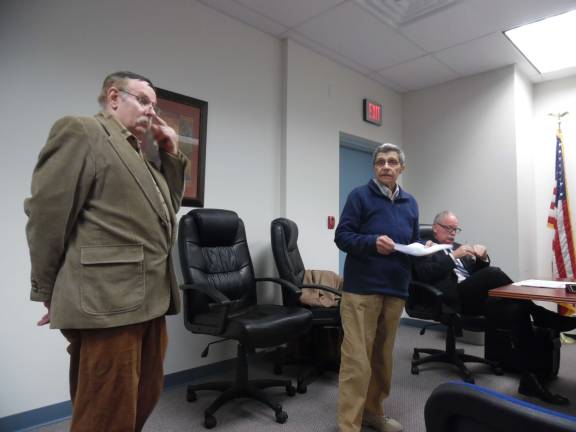Working together on tick-borne diseases a 'matter of life and death'

By Anya Tikka
DINGMAN TOWNSHIP — Tick-borne disease is spreading at an alarming rate, causing multiple and often misdiagnosed illnesses all over Pike County, local experts warn.
Mikki Weiss, chair of the Pike County Tick Borne Disease Task Force, and Dr. Robert Ollar, a microbiologist and researcher in the field, last month asked Dingman Township supervisors and the community for help gathering information about the different ways tick bites affect health. Weiss and Ollar described a frightening array of tick-borne illnesses that can resemble other neurological disorders, such as Lou Gehrig’s disease (ALS), Alzheimer's, and rheumatoid arthritis.
The state health department is refusing to do anything about the epidemic, they agreed, and even the federal government is unsupportive.
“It’s reaching epidemic proportions," Weiss said. "This is an immensely important topic. We’ll give you an overview of the situation. It is a matter of life and death, and we need your help. There’s definitely a way of working together as a community in Pike County.”
Lots more research into the multiple symptoms and treatments associated with tick-borne diseases must be done, they said.
“If you know people who have been diagnosed, we’re asking that you please help us," said Weiss.
Ticks carry many pathogens, she explained. Doctors test patients for some, but not all, pathogens, leaving others undetected.
“It’s an epidemic around the world,” said Weiss.
Many local health professionals don’t know the facts, she said. And so much more attention is given to Ebola and Zika virus, which are far easier to suppress, she said.
"The facts are, tick borne disease untreated can kill you," Weiss said. "It can be transmitted to children. Children are born with it. You live with it. We have a very critical situation in our commonwealth.”
Ollar said data about Pike County "is insignificant at this point."
"We’re only now starting to get phone calls as result of our presentations and meetings," he said. "It’s more complicated than dealing with AIDS. We feel if we can get 10 cases from each town, we have a good solid basis for research.”
Dingman population at risk
Ollar said Dingman's population, at about 12,000 year 'round, with many more in summer, is the largest around.“We don’t know how many Dingman and Pike residents are affected," he said. "Research is not being funded by the Department of Health. It’s outrageous that we have this epidemic.”
He gave an analogy to put the problem into perspective.
“Envision a four-foot poisonous deadly snake on your porch, but your door and widows are closed," he said. "In your basement there are termites that are devouring your home. Most people would be more afraid of the snake than the termites, but that’s what’s happening here.”
Dingman Supervisors Chair Tom Mincer and other supervisors agreed that everyone knows someone who has been infected by ticks.
“We don’t have a hospital here, so people go to New York, New Jersey and Scranton for diagnosis and treatment," Mincer said. "This doesn’t give us accurate numbers in Pike."
Tick-borne illnesses even affect dogs, like Mincer’s own, who suffered from pancreatic problems.
Getting local doctors onboard
Weiss said the task force continues to try to get local services and doctors onboard."We are dealing with the entire picture, trying to suppress it everywhere," Weiss said. "Bottom line, we need to get all the knowledge as to what we need to do to change this. I’m happy to say at this point Wayne Memorial is going to be offering services here. Hopefully, we can have Pike County residents helped. We ask supervisors to come together so everybody’s on the same page, and recommend the services Department of Health is recommending.”
Ollar said tick-borne diseases affect people who never set foot in the woods because some blood supplies have been tainted. Infants get these diseases in utero.
There’s no cure for tick-borne disease, although Lyme disease can be treated with intravenous drugs.
“Technology is not up to speed," Ollar said. "We don’t know how to monitor the effectiveness of treatment."
The task force is setting up an exchange of medical professionals and to develop a document about options.
“There’s no manual or document of recommendations in Pennsylvania," Ollar said. "You have to look it up online from New Jersey and New York, although we lead the nation in number of cases. Yet don’t have a manual for doctors."
But there is good news in all this, too. Ollar said Pike County's task force is "functioning better and doing more than any other endeavor around the Commonwealth.” Local schools are also now involved, he said.
“We have a model program for the rest of PA, and with little resources we can put together a program, collaborating, and trying to get research done," Ollar said. "We in Pike County are on our own.”
A task force questionnaire is available at the Pocono Environmental Education Center. For more information call 570-296-3569.